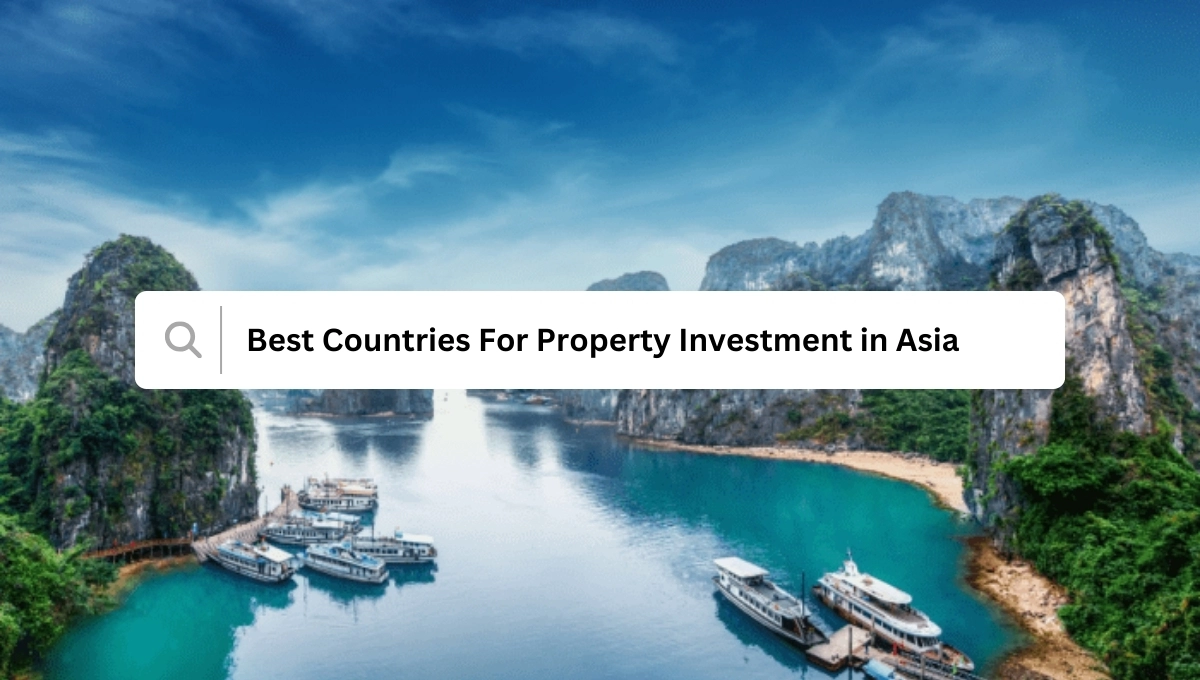Asia stands as a beacon for diverse opportunities in real estate investments, offering a plethora of options for investors seeking lucrative returns or future asset appreciation. With robust economic growth, varying legal frameworks and market dynamics, the continent showcases immense potential for those eyeing real estate as a means for income generation or long-term growth. In this blog post, we’ll delve into the top five countries within Asia, including Dubai, highlighting their investment attractiveness, discuss vital factors crucial to real estate investments in the region, and provide insights into making informed decisions.
Top 5 Countries In Asia to Invest In
(UAE)
UAE deserves to be on the top of the list for its robust real estate market. Known for luxury properties in Dubai, the country offers diverse opportunities, attracting investors worldwide. The city promises high returns on investment, especially in prime locations like Downtown Dubai, Palm Jumeirah, and Dubai Marina .
Singapore
A prosperous hub known for its stability and innovative industries, Singapore boasts a strong economy and cutting-edge infrastructure. While rental yields might average around 3%, its limited land supply promises high capital appreciation potential, especially in prime areas like Singapore City, Jurong East, and Punggol.
Vietnam
Among the fastest-growing countries, Vietnam offers a dynamic market ripe with investment opportunities. With attractive rental yields averaging 6% in cities like Ho Chi Minh, coupled with relatively low property prices, investing in areas like Ho Chi Minh City, Hanoi, or emerging locations like Phu Quoc can be promising.
Thailand
Known for its tourism appeal, Thailand possesses a stable economy and a well-connected infrastructure. Bangkok, Chiang Mai, and Phuket are hotspots for real estate investment, offering moderate rental yields averaging 4% and a friendly investment climate.
Philippines
With a booming economy and a youthful population, the Philippines stands out as an attractive investment destination. Cities like Manila, Cebu, and Davao offer high rental yields averaging 5%, fostering a strong demand for quality housing.
Factors to Consider While Investing in Real Estate in Asia
Investing in real estate in Asia requires a comprehensive understanding of several crucial factors that influence the profitability, sustainability, and success of investments. Here’s a detailed explanation of each factor to consider:
Economic Growth:
A robust and stable economy in a country fosters a conducive environment for real estate investments. Economic growth influences demand for residential, commercial, and industrial properties. A growing economy generally correlates with higher employment rates, increased disposable income, and a thriving market for real estate.
Considerations:
- Gross Domestic Product (GDP): Review the country’s GDP growth rate over recent years to gauge economic stability and growth potential.
- Employment Rates: Assess employment trends and job creation, as it impacts housing demand and rental markets.
- Sectoral Growth: Identify sectors driving economic growth (such as technology, manufacturing, or tourism) to determine areas with increasing real estate demand.
Political Stability:
Stability in the political landscape is crucial for property rights protection, legal enforcement, and overall market confidence. A politically stable environment ensures consistency in regulations and reduces the risk of abrupt policy changes that might adversely affect investments.
Considerations:
- Government Policies: Evaluate the government’s stance on property rights, foreign investment, and stability in governance.
- History of Political Stability: Review historical political events to gauge the country’s stability and its impact on the real estate market.
Legal Framework:
A transparent and consistent legal framework is essential for regulating real estate transactions, ensuring property rights, and resolving disputes. Understanding the legal environment helps investors navigate regulations related to ownership, taxes, and property development.
Considerations:
- Foreign Ownership Laws: Understand restrictions, if any, on foreign ownership of the best villas to live in Dubai, land, or specific types of real estate.
- Taxation and Regulations: Consider property taxes, transaction costs, and legal processes associated with buying, selling, or renting properties.
Infrastructure Development:
Well-developed infrastructure, including transportation networks, utilities, healthcare, education, and amenities, enhances the attractiveness of a location for real estate investments. Infrastructure development influences property values and tenant demand.
Considerations:
- Transportation Connectivity: Assess accessibility to key areas, public transportation, and proximity to essential amenities.
- Future Development Plans: Understand planned infrastructure projects that might impact property values positively or negatively.
Market Dynamics:
Market dynamics encompass factors such as population growth, urbanisation trends, income distribution, cultural preferences, and global economic shifts that influence supply and demand in the real estate market.
Considerations:
- Population Trends: Analyse population growth and migration patterns impacting housing demand.
- Urbanisation: Consider trends in urban development and lifestyle preferences affecting property preferences and values.
- Consumer Preferences: Understand the target market’s preferences for property types, location, and amenities.
By thoroughly evaluating these factors, investors can make informed decisions, mitigate risks, and capitalize on the vast opportunities present in the diverse real estate markets across Asia.
Conclusion
Asia’s real estate landscape offers a spectrum of opportunities catering to various investment goals. While Singapore, Vietnam, Thailand, the Philippines, and the UAE present promising prospects, careful consideration of economic, political, legal, infrastructural, and market dynamics is imperative when making investment decisions. Understanding these factors equips investors to capitalize on the growth potential and diversity that Asia’s real estate markets offer.





